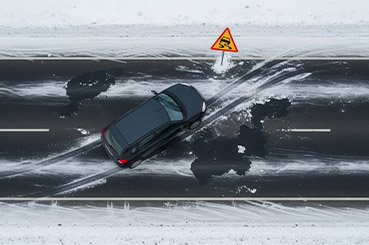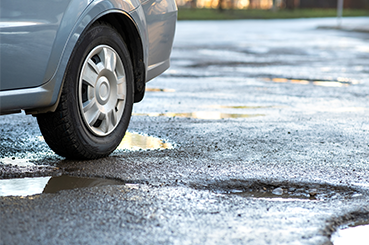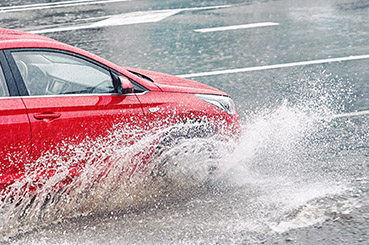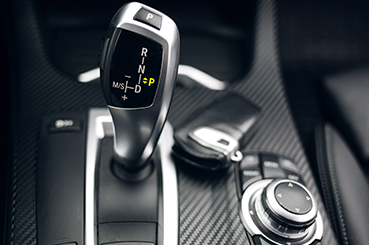Is winter weather making your UK drives a little more treacherous? Don’t worry, you’re not alone! Our unpredictable British climate often throws up snowy surprises, icy roads, and foggy conditions. But with a little preparation and know-how, you can stay safe and keep your journey smooth.
In this blog, we’ll provide you with essential tips and advice to help you navigate the UK’s winter roads confidently. From preparing your vehicle to understanding winter driving techniques, we’ve got you covered. So, let’s hit the road and conquer winter together!

How To Check Your Car for Winter?
If you’re planning on driving in tough winter conditions, the first question you should ask is: is this journey necessary? Making a journey in your car that isn’t imperative or is one you could walk can sometimes be a risky action when the weather is adverse. If it is necessary and isn’t walkable, knowing what you might be facing is important. So, check the weather reports for what’s incoming whilst you’re out and about, and if there are any road closures due to heavy snow.
Before setting off, we also recommend checking:
Tyres:
Tyre pressures can drop in colder weather. This is because at cooler temperatures air becomes denser which results in a pressure drop. Therefore if you’re checking and setting your tyre pressure in a warm workshop you should add around 0.2 bar (3psi) to the manufacturer’s recommended pressure rating.
It is important to keep your tyres correctly inflated to ensure that they work effectively, especially in winter when road conditions are more challenging to drive on. Wet, icy or snowy conditions increase stopping distances and can make it harder to control your vehicle; so there really is no better time to check the condition of your tyres.
Car Battery:
The cold weather can inhibit the chemical reaction that makes a battery work and as a result, the battery will lack power. On top of this in cool conditions, oil isn’t as fluid as it is in summer, so the engine can be harder to start. Essentially this means not only do you potentially have less power from the battery you also need more power to start the engine.
Therefore, for ICE cars, check the battery is as charged as it can be by taking it on a long run before the bad weather hits. For plug-in hybrid cars and electric vehicles, ensuring you charge the battery to around 80% before going anywhere can help avoid running out of power mid-journey.
Fuel:
Check how much fuel is in the car and if it’s enough to not just get where you’re going and back, but also enough if you get stuck or have to go a longer route.

Windscreen Wipers:
If you’re caught in a snow shower, your wipers will work overtime. Make sure they’re in good condition and top up your screen wash for maximum visibility.
Windows:
You’ll need maximum visibility if you’re caught in heavy snow, so before you set off make sure your windows are clean and clear.
Lights:
Falling snow can be as challenging as thick fog and many of the same rules apply. Ensure your lights are fully cleared before setting off.
Whilst driving, dipped headlights will be more effective than full beam and your fog lights will help with visibility. Try not to rely too much on the lights of other vehicles – using them to guide your own driving can lead to getting dangerously close.

What Do You Need in Your Car for Winter Driving?
When the temperatures drop and the roads become icy, it’s crucial to have your car equipped with the necessary tools and supplies. Being prepared can make all the difference in ensuring a safe and comfortable winter driving experience.
- Warm clothes
- Thermal blankets
- Fully charged mobile phone (+ portable phone charger)
- Working torch and spare batteries
- Emergency food (recommend non-perishables like cereal bars)
- First aid kit
- De-icing equipment (de-icer/ice-scraper/demister cloth)
- Wellington boots / Sturdy Boots
- Hazard warning triangle
- Reflective clothing
- Shovel
- Tow rope
- Jump-start cables
- Road Map
- Something to help you gain traction (cut off of some carpet that can be popped under the front wheels or even a bag of cat litter that will add grit to the road helping increase traction).
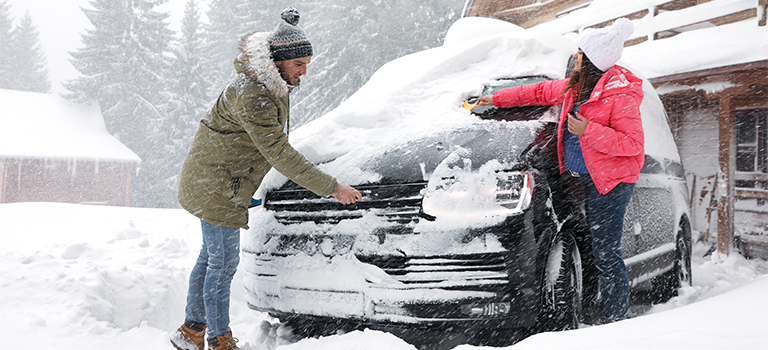

How to De-Ice Your Car Quickly and Safely:
Whilst we’ve all done it, there are some rules you should follow when de-icing your car to ensure that you and your vehicle remain safe and secure.
1. First and foremost – do not pour hot or boiling water on the windscreen. The vast change in temperature could cause your windscreen to crack, creating a much bigger problem.
2. Start your car and turn the heater to the highest setting. If you have air-conditioning, make sure this is switched on as it helps to clear your windscreen faster.
3. It is important to remember not to leave your car unattended whilst it is running. Firstly, a driver should be in control of their vehicle when it is running and you risk a fine and secondly, you are making it extremely easy for someone to steal your car.
4. Remove all snow from your car, using a soft brush if possible. The Highway Code states that you must be able to see, that all lights are clean and all number plates are clearly visible.
5. Remove ice from your windscreen using an ice scraper or brush. Don’t be tempted to use something like a credit card, as this could scratch the glass and impair your vision.
6. You could also use a professional de-icer product to help clear the ice from your windscreen. Some people suggest using a salt-based or vinegar-based solution, but these can corrode your paintwork.
7. Don’t turn your wipers on until all the ice has thawed, as you may cause damage to them.
8. You must wait until your windscreen is completely clear before setting off on your journey.
9. You can help to prevent ice from forming on your windscreen overnight by placing a towel or special cover on your windscreen before the temperature drops.
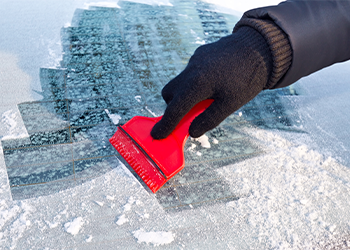

How Can I Drive Better in the Winter?
After completing the previous steps, you and your car should be prepared to set off on your journey. Make sure you plan your journey before you set off. Even if you will be using a satnav, it’s advisable to have a rough idea of the route you will be taking so if you lose signal you will still know roughly where you are heading.
Tip 1: Smoothly Does It
One of the most important things to remember when driving in snow or ice is to keep all transitions as smooth as possible. This means making smooth gear transitions and braking and accelerating gently.
When pulling away use second gear to help increase your traction and then as you move away you should use the highest gear practically possible to help maintain traction and allow you to take advantage of engine braking.
How To Drive Automatically in Snow?
In an automatic car, you cannot select the gear you are in, so it is important you take even greater care when driving and maintain a steady speed and safe stopping distance. Some automatic gearboxes come with an L, 2 or +/- setting which enables drivers to change up into a higher or lower gear in wintry conditions.
Tip 2: Maintain a Safe Distance
Stopping distances can be as much as ten times greater than normal in icy or snowy conditions. Therefore, you must maintain a safe distance between you and the car in front.
It is also important to stay alert to the movements of the car in front making sure you slow down as they do so to prevent you needing to slam on the brakes.
Tip 3: Reduce Distractions
To help keep you alert and more in tune with the conditions outside the car it is advisable to turn down the radio when driving in wintry conditions. When travelling on snow, you will usually hear it crunching under the tyres whereas ice is usually silent. So, if you can’t hear any crunching you are probably travelling on ice and will need to take even more care.
Another tip to help reduce distraction is to put your mobile phone on silent in the glovebox
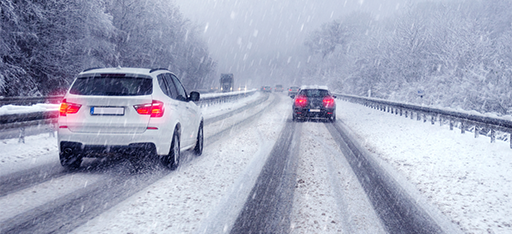
Tip 4: Stay Calm
You should try to stay calm behind the wheel whenever driving, however, in wintry conditions it is especially important. Sudden movements or rash decisions can result in you losing control of the vehicle, so take a deep breath and take your time.
Keep to a speed you feel comfortable with and if you do feel someone is travelling too close behind you, simply pull over if it is safe to do so and let them pass.
If you start to skid, try not to panic. Avoid applying the brake which may make the situation worse. Instead, ease off the accelerator pedal and keep the wheels pointing the way you wish to go. As previously mentioned, it is really important to keep actions as smooth as possible.
Tip 5: Getting Stuck in Snow
If you are unlucky enough to end up stuck in the snow, then it is important to not just keep accelerating if the wheels are continually spinning as it may dig you in deeper. A good tip is to turn the wheel from side to side to move the tyres which should help to push the snow out of the way. You can then try accelerating away again.
If that doesn’t work, you may need to grab your snow shovel and start digging your tyres out. Remember the old carpet/cat litter we suggested? Well if you are carrying it then place it under the front wheels to give your tyres something to grip.
If the car is completely stuck, it is a good idea to keep the engine running to help keep you warm, while you wait for assistance. However, you must check the exhaust is free from snow before doing so to prevent the car from filling with harmful exhaust fumes.
Tip 6: Plenty of Rest Before and Stop When Needed
While some may scoff at this one, you must be well-rested before you set off on a long drive. Driving when tired has been compared to driving when under the influence of alcohol. Research published on Think.co.uk suggests that 20% of accidents on major roads are sleep related. Fatigue reduces your reaction time, concentration and alertness so it is important to recognise when you need to take a break behind the wheel.
The AA suggests taking at least a fifteen-minute break every three hours of driving. Incorporating stops can enhance your journey so why not plan to stop off at a picturesque village or town you’ve always wanted to explore?
This is even more important when driving in challenging weather conditions as you are required to concentrate even more, which can result in you tiring sooner.

Winter Tyres:
You might be asking yourself ‘Should I get winter tyres?’. While they are more expensive for your vehicle and not compulsory, in the UK they do have their benefits in the winter months when road surfaces are cold and icy.
They are specially made from a softer compound which contains more natural rubber. The result is the tyre remains supple in cooler temperatures which helps to improve the tyre’s performance. Winter tyres feature narrow cuts, known as sipes, built into the tread. Sipes help to prevent snow from building up and clogging the tread channels. The tread depth of winter tyres is also deeper, usually, around 8-9mm compared to a summer tyre which is usually 7-8mm.
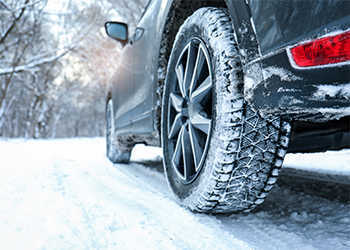
How Do They Work?
Winter tyres are designed to offer optimum traction and grip when the temperature is below seven degrees Celsius. From the way they’re designed, they provide better traction, more grip when cornering and can improve braking. The deeper tread pattern helps to disperse surface water and reduces the risk of aquaplaning. This means winter tyres also perform better in wet conditions than summer tyres.
The tread design gathers a certain amount of snow ‘infill’ in the tread grooves. This helps to improve grip on packed snow as nothing grips snow better than snow. While the sipes provide extra edges which grip the road as the tyre rotates.
Where Can I Buy Winter Tyres?
Winter tyres are available across the Stoneacre network. We can supply or supply and fit a range of popular and hardwearing winter tyres. So, what are you waiting for? Book in and get your tyres switched to winter tyres before the worst weather sets in.

Frequently Asked Questions for Winter Driving
How Can You Tell if You Are Driving on Ice?
- Loss of traction: If your car feels like it’s slipping or sliding, you might be on ice.
- Steering wheel: If your steering wheel feels like it’s turning easily without affecting your direction, you could be on black ice.
- Brakes: If your brakes feel less effective than usual, there might be ice beneath the snow.
Is it Better to Drive in High or Low Gear in Snow?
Driving in a lower gear provides more torque, which can help you maintain traction on slippery surfaces.
How To Brake on Ice?
- Pump the brakes: Gently pump your brakes to avoid locking up your wheels and causing a skid.
- Downshift: If you’re driving in a higher gear, downshift to slow down gradually.
- Avoid sudden movements: Steer and brake smoothly to maintain control.
How To Drive Front Wheel Drive in Snow?
- Avoid sudden acceleration: Accelerate gradually to prevent wheelspin.
- Brake smoothly: Apply the brakes gently to avoid locking up the wheels.
- Avoid uphill starts: If possible, avoid starting on steep inclines to prevent wheelspin.
Should I Turn Traction Control Off When Driving in Snow?
No: Traction control is designed to help prevent wheelspin and maintain control on slippery surfaces. Turning it off can increase the risk of accidents.
Read more about the Winter Driving Myths with our blog.
How Do I Stop My Car from Skidding in The Snow?
- Avoid sudden movements: Steer and brake smoothly to prevent loss of control.
- Counter-steer: If your car starts to skid, turn the steering wheel in the opposite direction of the skid.
- Look where you want to go: Focusing on where you want to go can help you steer the car in the right direction.

The main thing is to stay safe on the roads during the winter. Following these suggestions will help keep you, your passengers and other road users safe on the road during cold weather. You can also book your vehicle in for a winter health check at any Stoneacre service centre for a professional assessment of your car’s suitability for cold weather during winter.
Allow yourself extra time in the mornings to prepare your car safely for travel and don’t rush to leave. It’s better to arrive safely than not at all. Take your time to properly de-ice your car.
